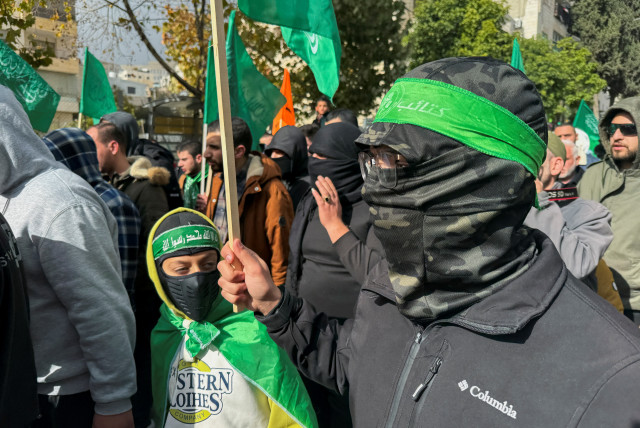Saleh al-Arouri killing deals blow to Hamas but conflict may still widen - analysis

The senior Hamas figure was a savvy strategist with a large network of contacts and his absence will be felt, but Hamas has lost leaders before and will recover.
The killing of senior Hamas figure Saleh al-Arouri in Beirut on Tuesday has checked off a big name from Israel’s most-wanted list, but his assassination may spark a wider conflict in the region.
Arouri was a founding commander of Hamas' military wing, the Izz ad-Din al-Qassam Brigades, and was said to be a deputy chairman of Hamas' political bureau as well as the Hamas military commander of the West Bank, despite living in Lebanon for the last years of his life.
He was a savvy politician and strategist, actively involved in bringing in money and weapons for Hamas, and had a massive network of contacts. He helped recruit new members to Hamas in the West Bank, and was even able to have good relations with officials from the rival Fatah party such as Jibril Rajoub, who sent his condolences after Arouri's death was confirmed. However, Palestinian Authority President Mahmoud Abbas has yet to do so.
Arouri also helped maintain close ties with Iran and its top Islamic Revolutionary Guard Corps leaders, which many say brought in more sophisticated weapons and better military and security training for Hamas members. Losing Arouri constitutes a significant blow to Hamas, especially as it fights for its survival in the Gaza Strip.
After Hamas attacked Israel on Oct. 7 and slaughtered some 1,200 people and abducted over 240 others, Israel launched an intensive military campaign in Gaza with the stated intention of destroying Hamas' military and political capabilities. According to the Hamas-run authorities in Gaza, more than 22,000 Palestinians have been killed since. "Saleh al-Arouri was a unique leader, a unitary man, the architect of the resistance, a thinker, a humble person, and a revolutionary realist. He will be greatly missed," Ramallah-based political analyst Esmat Mansour told The Media Line.
"His absence will surely have an effect on Hamas. It will no doubt set the group back. It will have an effect on the negotiations and the war in Gaza. He will be hard to replace," Mansour said.
Arouri’s killing brought vows of revenge from Hezbollah leader Hassan Nasrallah, who several months ago said that any assassinations in Lebanon would meet with a strong response. On Wednesday, a day after the Arouri killing, he said that Israel would “not go unpunished.”
Israel has not claimed responsibility for the killing
Arouri, 57, was the first senior Hamas political leader to be assassinated outside the Palestinian territories since Israel vowed to eliminate the group following the Oct. 7 attack.
Arouri was born in Arura in the West Bank and studied Islamic law at Hebron University, where he became head of the Islamist faction. He was recruited to Hamas during the First Intifada in 1987, and, starting in 1990, was arrested and jailed several times by Israel for his Hamas activities. He played a significant role in negotiating the release of more than 1,000 Palestinian prisoners held in Israeli jails in exchange for the release of abducted Israeli soldier Gilad Shalit from Hamas captivity in 2011.
In 2015, the US Treasury accused Arouri of funding and directing Hamas’s military operations in the West Bank and linked him to several attacks, hijackings and kidnappings, and the United States designated him a terrorist, offering a $5 million bounty for information leading to his arrest.
On Wednesday, Israel's Mossad spy chief David Barnea said he was committed to "settling the score" with Hamas."Let every Arab mother know that if her son took part, directly or indirectly, in the October 7 massacre, his blood is forfeit," he said.
US State Department spokesman Matthew Miller said Wednesday that Arouri “was a brutal terrorist who was centrally responsible for the attacks of October 7, as well as other attacks against innocent civilians.” He said that the US did not receive any advance warning about the strike on Arouri.
Faris Sarfandi, a political analyst in Ramallah, told The Media Line that Arouri's death was a loss to Hamas.
"He never feared death, he was always ready for it. Arouri was a charismatic leader who was able to attract many to the group and engage with his rivals," Sarfandi said.
"He would have been tasked with rebuilding Hamas's military capabilities through his close ties with Iran. Three months of grueling war with Israel has depleted the group's arsenal and someone with the skills of Arouri is desperately needed to replenish its weapon cache. The loss of a senior figure could push Hamas to take a tougher line against Israel."
Hossam Badran, a Hamas political leader in exile, responded to Arouri's death by saying: "We tell the criminal occupation [Israel] that the battle between us and them is open.”
Ahmad Rafiq Awad, a professor at Al-Quds University in Abu Dis in the West Bank, told The Media Line that despite the great loss to the group, it has a hierarchy and nurtures other leaders.
Awad said that this is not the first time Hamas has lost senior officials.
"The group was always able to recover. Those killings made the group stronger and it promotes from within. It has great trust in its members," he said.
Jerusalem Post Store
`; document.getElementById("linkPremium").innerHTML = cont; var divWithLink = document.getElementById("premium-link"); if (divWithLink !== null && divWithLink !== 'undefined') { divWithLink.style.border = "solid 1px #cb0f3e"; divWithLink.style.textAlign = "center"; divWithLink.style.marginBottom = "15px"; divWithLink.style.marginTop = "15px"; divWithLink.style.width = "100%"; divWithLink.style.backgroundColor = "#122952"; divWithLink.style.color = "#ffffff"; divWithLink.style.lineHeight = "1.5"; } } (function (v, i) { });

